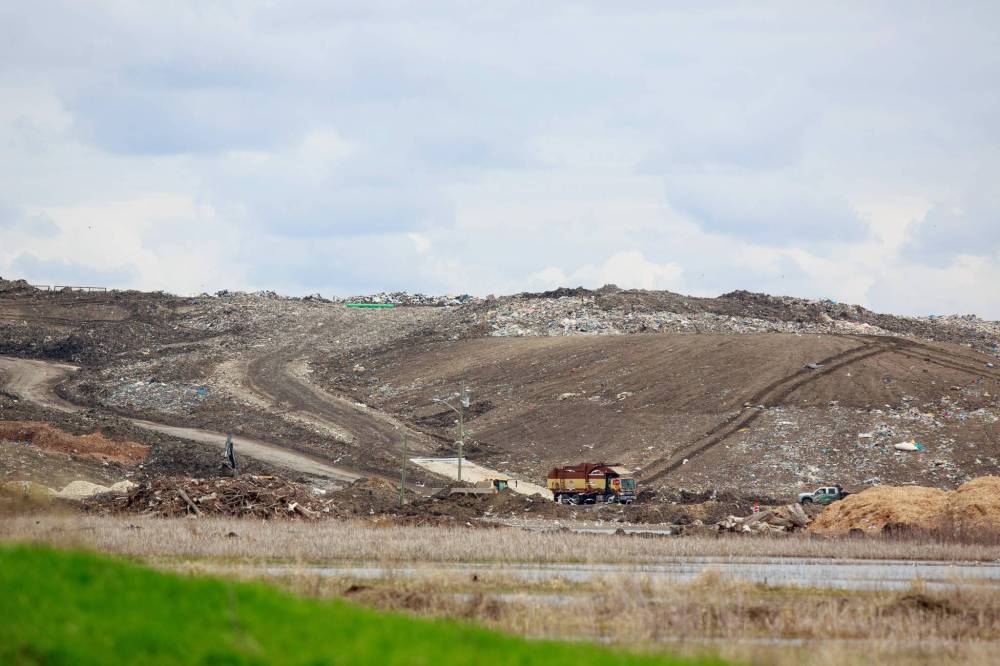City residential trash volume dips in 2021
Advertisement
Read this article for free:
or
Already have an account? Log in here »
To continue reading, please subscribe:
Monthly Digital Subscription
$0 for the first 4 weeks*
- Enjoy unlimited reading on winnipegfreepress.com
- Read the E-Edition, our digital replica newspaper
- Access News Break, our award-winning app
- Play interactive puzzles
*No charge for 4 weeks then price increases to the regular rate of $19.00 plus GST every four weeks. Offer available to new and qualified returning subscribers only. Cancel any time.
Monthly Digital Subscription
$4.75/week*
- Enjoy unlimited reading on winnipegfreepress.com
- Read the E-Edition, our digital replica newspaper
- Access News Break, our award-winning app
- Play interactive puzzles
*Billed as $19 plus GST every four weeks. Cancel any time.
To continue reading, please subscribe:
Add Free Press access to your Brandon Sun subscription for only an additional
$1 for the first 4 weeks*
*Your next subscription payment will increase by $1.00 and you will be charged $16.99 plus GST for four weeks. After four weeks, your payment will increase to $23.99 plus GST every four weeks.
Read unlimited articles for free today:
or
Already have an account? Log in here »
Hey there, time traveller!
This article was published 24/06/2022 (1264 days ago), so information in it may no longer be current.
After a COVID-19 pandemic spike in trash levels, Winnipeggers threw out less garbage in 2021, while also keeping a slightly smaller portion of their waste out of the landfill.
The overall volume of residential waste last year fell 6.6 per cent from the previous year, dropping to 284,700 tonnes in 2021 from 304,400 tonnes in 2020, and falling closer to pre-pandemic levels.
Per capita garbage generation fell by 5.5 per cent (which doesn’t include recycling or yard-waste pickups), dropping to 184,930 tonnes from 194,570 tonnes during the same period.

Winnipeggers diverted just 30.2 per cent of their trash from the dump last year, down from 31.1 per cent in 2020, falling short of the 50 per cent diversion target the city set in 2011 when Winnipeg expected to introduce curbside compost collection by 2017.
Coun. Brian Mayes, head of council’s water and waste committee, said it’s disappointing, but not unexpected, to see the waste diversion rate largely plateau before dipping in 2021. Staff have long warned a citywide curbside compost pickup program is needed to meet the target, he added.
“We’ve got to either accept that (delay) or bite the bullet and move on and do the organics. My own preference, to be clear, is I’d like to start doing the organic (service),” Mayes said Friday. “(Our staff have said) if you want us to hit the target, you’ve got to give us the green light to do the organics.”
The city report notes the waste diversion rate has remained stable since 2015.
The report says a 19.6 per cent drop in the amount of leaf and yard waste materials collected for composting in 2021 should likely be blamed on drought, which resulted in less plant growth.
The city’s long-awaited curbside composting program has been primarily postponed over cost concerns. A late-2019 estimate predicted a year-round organic waste processing facility would cost between $25 million and $58 million, though the report cautioned that figure was preliminary. Citywide collection was expected to cost another $17 million to implement, plus $9.6 million of annual operating costs.
While the city will complete a two-year pilot project of curbside composting at 4,000 households in October, city council is not expected to consider options for citywide collection until sometime in 2023.
Mayes said he’s open to considering whether the city could begin an outdoor seasonal program, such as one that lasts six months per year, to get the service started sooner. Council could also explore options to shift to less frequent waste collection, such as once every two weeks instead of weekly, to help make a citywide compost service more affordable, he said.
The city doesn’t expect to run out of room in its south end landfill any time soon, there is still a clear environmental need to add compost collection, said Mayes.
“It’s (about) the methane production… just trying to do something for climate change.”
Methane produced at landfills as organic waste decomposes is an especially potent source of greenhouse gas emissions.
It’s urgent the city reduce that pollution, among other emissions, a local environmental advocate said.
“We need to make sure that we are on top of lowering our emissions and lowering our carbon footprint,” said Deborah Clark, executive director of the Green Action Centre.
Winnipeg’s climate action plan includes a target to cut greenhouse gas emissions to 80 per cent below 2011 levels by 2050.
Clark noted the COVID-19 pandemic triggered a major spike in the disposal of single-use plastics, especially once Winnipeggers grew accustomed to getting food delivered instead of visiting restaurants.
The wait for a composting program in Manitoba’s capital city remains a concern, since so many other Canadian cities already offer it, she said.
“It should be concerning to every Manitoban that we are lagging behind every province, with regards to how green and healthy our province is.”
joyanne.pursaga@freepress.mb.ca
Twitter: @joyanne_pursaga
-30-

Born and raised in Winnipeg, Joyanne loves to tell the stories of this city, especially when politics is involved. Joyanne became the city hall reporter for the Winnipeg Free Press in early 2020.
Our newsroom depends on a growing audience of readers to power our journalism. If you are not a paid reader, please consider becoming a subscriber.
Our newsroom depends on its audience of readers to power our journalism. Thank you for your support.


